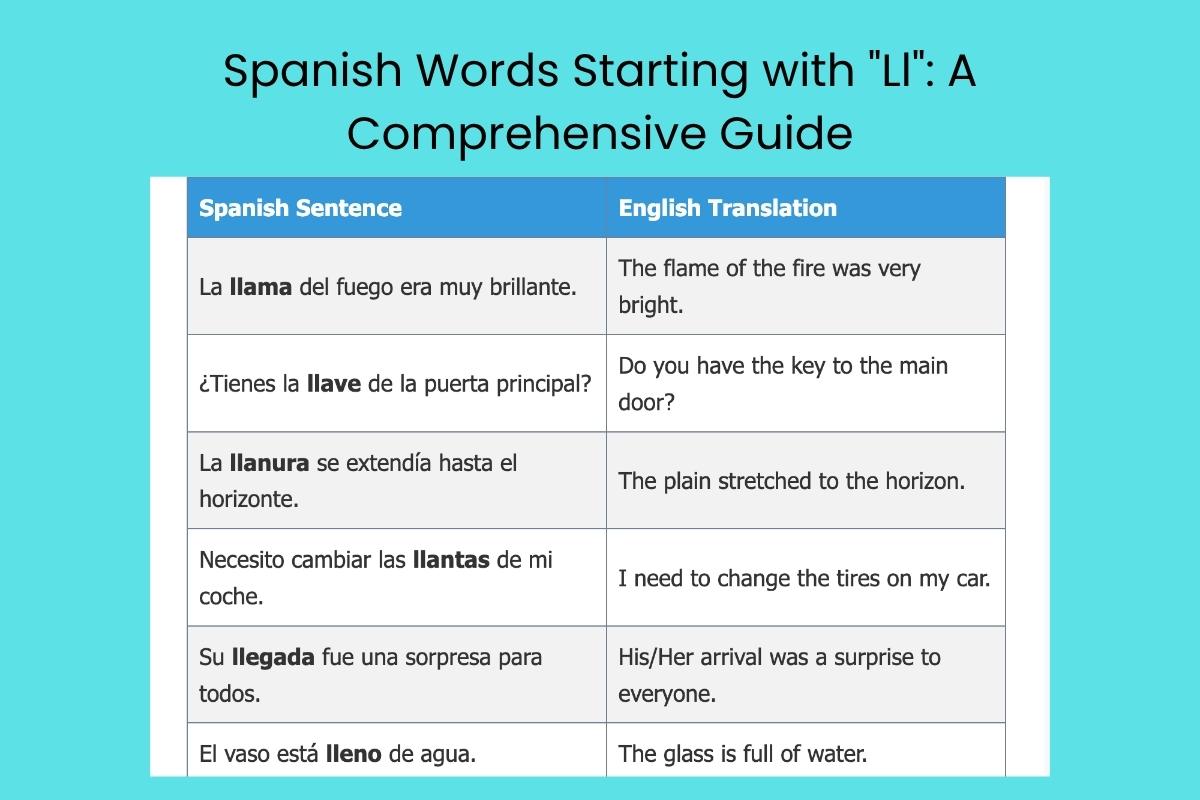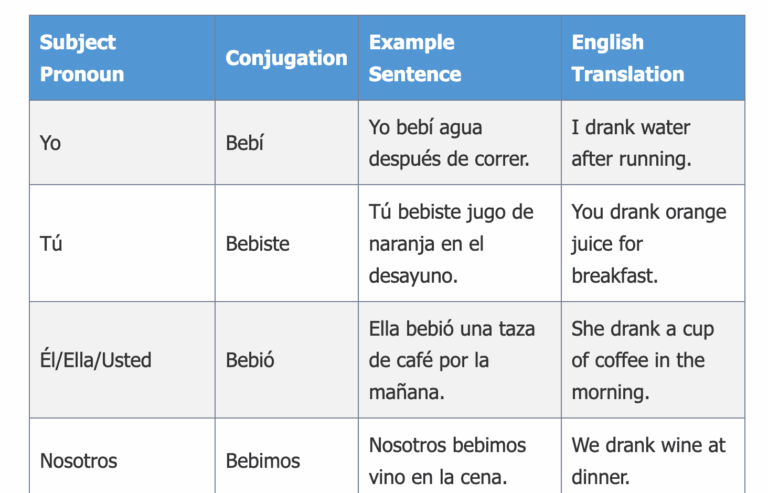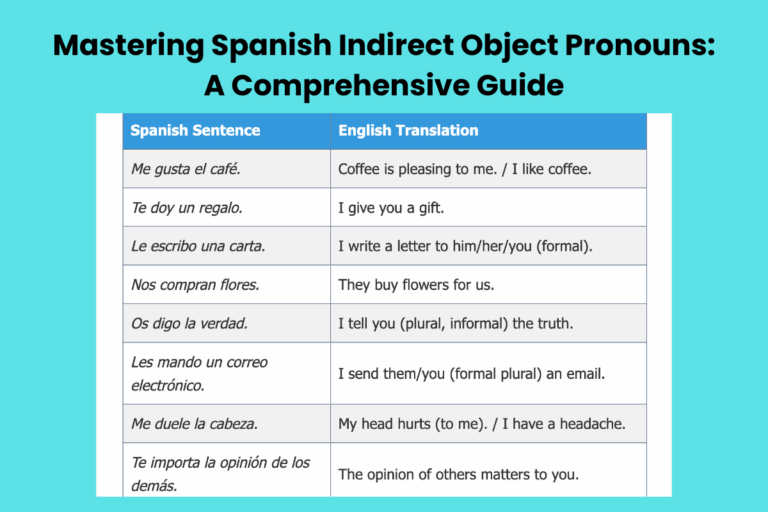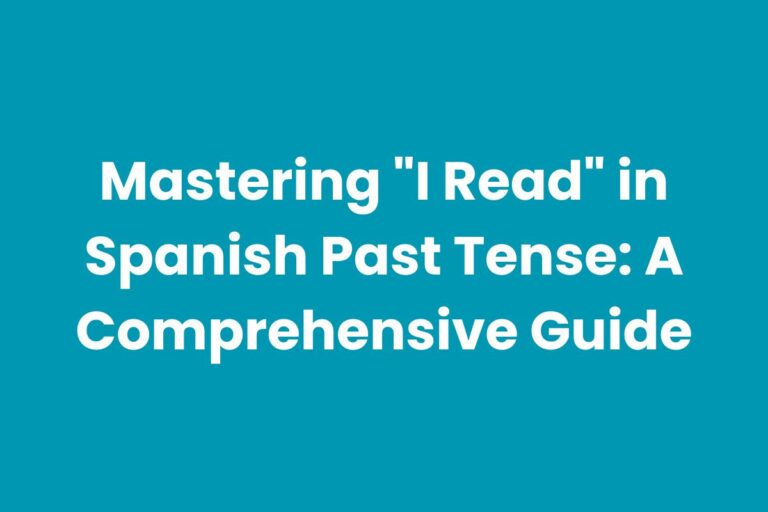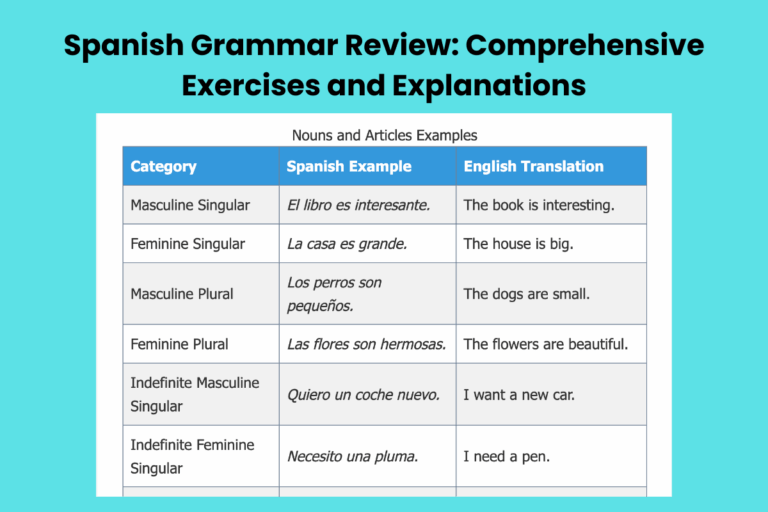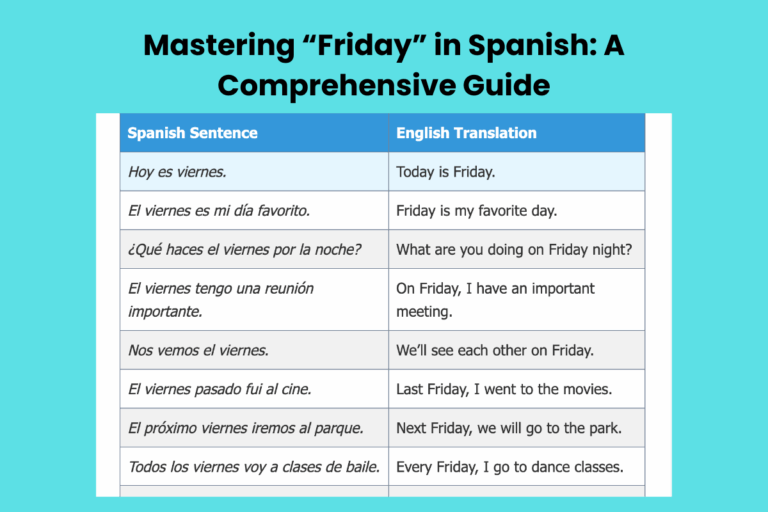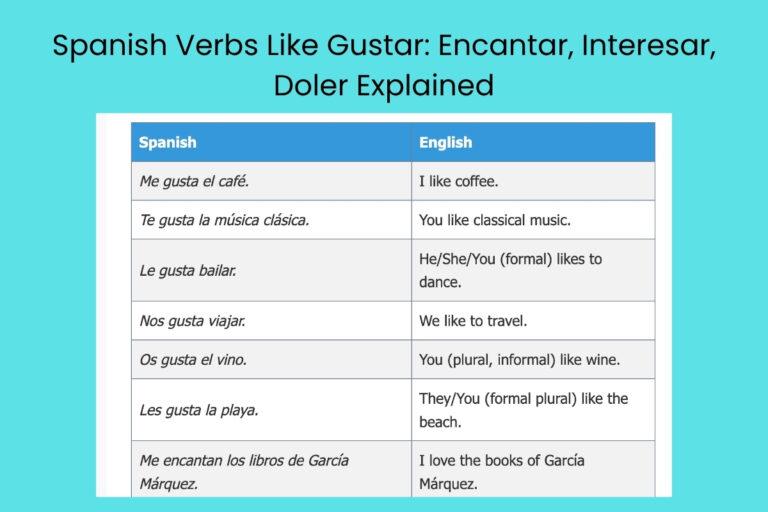Spanish Words Starting with “Ll”: A Comprehensive Guide
Understanding words beginning with “ll” in Spanish is crucial for mastering pronunciation, expanding vocabulary, and achieving fluency. The “ll” digraph, while seemingly simple, presents unique challenges for English speakers due to its varied pronunciations across different Spanish-speaking regions.
This guide provides a comprehensive overview of “ll” words, their meanings, usage, and common pitfalls. Whether you are a beginner or an advanced learner, this article will equip you with the knowledge and practice needed to confidently use “ll” words in your Spanish communication.
Table of Contents
- Introduction
- Definition of ‘Ll’ in Spanish
- Pronunciation of ‘Ll’
- Structural Breakdown
- Common Spanish Words Starting with ‘Ll’
- Examples of ‘Ll’ Words in Sentences
- Usage Rules
- Common Mistakes
- Practice Exercises
- Advanced Topics
- FAQ
- Conclusion
Definition of ‘Ll’ in Spanish
In Spanish, “ll” is a digraph, which means it’s a combination of two letters that represent a single sound. It is considered a single letter for the purpose of alphabetization in traditional Spanish dictionaries, though modern dictionaries often group words starting with “ll” under the letter “l”.
The pronunciation of “ll” varies significantly across different Spanish-speaking regions, making it a unique and sometimes challenging aspect of the language.
The primary function of “ll” is to represent a sound that is distinct from the single “l”. Its historical pronunciation was similar to the “lli” sound in the English word “million.” Over time, the pronunciation has evolved and diverged geographically.
Understanding the historical context and regional variations is crucial for mastering its usage.
Pronunciation of ‘Ll’
The pronunciation of “ll” is not uniform throughout the Spanish-speaking world. The two main pronunciation groups are those of Spain and Latin America.
Within these regions, further variations can also exist.
Pronunciation in Spain
In many parts of Spain, particularly in the central and northern regions, “ll” is traditionally pronounced as a palatal lateral approximant, similar to the “lli” sound in the English word “million”. This sound is represented phonetically as /ʎ/. However, a phenomenon called yeísmo, where “ll” is pronounced the same as “y,” is increasingly common, even in Spain. Therefore, the “y” sound, represented as /ʝ/, is frequently used.
For example, the word “calle” (street) would ideally be pronounced with the /ʎ/ sound. However, due to yeísmo, many speakers pronounce it with the /ʝ/ sound, making it sound identical to “calle” (he/she is silent).
Pronunciation in Latin America
In most of Latin America, yeísmo is widespread, meaning that “ll” and “y” are pronounced identically, typically as /ʝ/. This sound is similar to the “y” in the English word “yes” or the “j” in the Spanish word “jefe“. In some areas, particularly in Argentina and Uruguay, the pronunciation can even evolve to a “sh” sound, represented as /ʃ/.
Therefore, in Latin America, the word “lluvia” (rain) might sound the same as “yuca” (cassava). The exact sound can vary depending on the speaker’s region and dialect.
Structural Breakdown
The “ll” digraph is always found at the beginning or in the middle of a word. It never appears at the end.
The letters following “ll” usually determine the grammatical function of the word. For example, if “ll” is followed by “-a,” “-o,” “-e,” or “-i,” it might be part of a noun, verb, or adjective.
The combination of “ll” with other letters adheres to standard Spanish phonetic rules.
When analyzing the structure, it’s important to consider the word’s etymology. Many Spanish words containing “ll” have Latin roots where the “cl” or “pl” sound evolved into “ll” over time. For example, the word “llamar” (to call) comes from the Latin word “clamare.”
Common Spanish Words Starting with ‘Ll’
Many essential Spanish words begin with “ll”. These words span various grammatical categories, including nouns, verbs, adjectives, and adverbs.
Understanding these common words is fundamental for building a strong Spanish vocabulary.
Nouns
Nouns starting with “ll” are abundant in the Spanish language, covering a wide range of concepts, objects, and places. Here are some examples:
- Llama (flame, llama)
- Llave (key)
- Llanura (plain, prairie)
- Llantas (tires)
- Llegada (arrival)
- Lleno (full)
- Lloro (crying)
- Llovizna (drizzle)
- Lluvia (rain)
Verbs
Verbs starting with “ll” are also common and represent diverse actions and states. They are essential for constructing sentences and expressing ideas.
- Llamar (to call)
- Llegar (to arrive)
- Llenar (to fill)
- Llevar (to carry, to take)
- Llorar (to cry)
- Llover (to rain)
Adjectives
Adjectives beginning with “ll” are used to describe nouns and add detail to sentences. They help to paint a more vivid picture with words.
- Lleno/a (full)
- Llorón/ona (crybaby, tearful)
Adverbs
Adverbs starting with “ll” are less common but still important for modifying verbs, adjectives, or other adverbs, providing additional information about manner, time, place, or degree.
- Llano (plainly, clearly) – although more commonly used as an adjective.
Examples of ‘Ll’ Words in Sentences
To fully understand how “ll” words are used, it’s helpful to see them in context within sentences. Here are various examples categorized by grammatical function.
Nouns Examples
Here are some example sentences using nouns that start with “ll”.
| Spanish Sentence | English Translation |
|---|---|
| La llama del fuego era muy brillante. | The flame of the fire was very bright. |
| ¿Tienes la llave de la puerta principal? | Do you have the key to the main door? |
| La llanura se extendía hasta el horizonte. | The plain stretched to the horizon. |
| Necesito cambiar las llantas de mi coche. | I need to change the tires on my car. |
| Su llegada fue una sorpresa para todos. | His/Her arrival was a surprise to everyone. |
| El vaso está lleno de agua. | The glass is full of water. |
| No me gusta escuchar el lloro de los bebés. | I don’t like to hear babies crying. |
| Hoy hay llovizna, así que lleva un paraguas. | Today there is drizzle, so take an umbrella. |
| La lluvia es muy fuerte esta tarde. | The rain is very heavy this afternoon. |
| La llama escupió al turista. | The llama spat on the tourist. |
| Perdí la llave de mi casa. | I lost my house key. |
| La llanura era vasta y hermosa. | The plain was vast and beautiful. |
| Las llantas de mi bicicleta están desinfladas. | My bicycle tires are flat. |
| La llegada del tren se retrasó. | The train’s arrival was delayed. |
| El estadio estaba lleno de gente. | The stadium was full of people. |
| El lloro del niño era desconsolador. | The child’s crying was heartbreaking. |
| La llovizna empapó mi abrigo. | The drizzle soaked my coat. |
| La lluvia arruinó el picnic. | The rain ruined the picnic. |
| La llama es un animal andino. | The llama is an Andean animal. |
| Necesito una llave inglesa. | I need a wrench. |
| Cruzamos la llanura en coche. | We crossed the plain by car. |
| Compré nuevas llantas para el invierno. | I bought new tires for the winter. |
| Esperamos su llegada con entusiasmo. | We eagerly awaited his/her arrival. |
| Mi corazón está lleno de alegría. | My heart is full of joy. |
| El lloro del bebé me despertó. | The baby’s crying woke me up. |
| La llovizna hacía el día triste. | The drizzle made the day sad. |
| Me gusta el sonido de la lluvia. | I like the sound of the rain. |
Verbs Examples
The following table contains example sentences using verbs that start with “ll”.
| Spanish Sentence | English Translation |
|---|---|
| Me tienes que llamar cuando llegues. | You have to call me when you arrive. |
| ¿A qué hora vas a llegar? | What time are you going to arrive? |
| Por favor, llena el vaso con agua. | Please fill the glass with water. |
| Voy a llevar este paquete a la oficina de correos. | I’m going to take this package to the post office. |
| No debes llorar por cosas pequeñas. | You shouldn’t cry over small things. |
| Está empezando a llover. | It’s starting to rain. |
| Necesito llamar a mi madre. | I need to call my mother. |
| Espero llegar a tiempo a la reunión. | I hope to arrive on time for the meeting. |
| Por favor, llena el formulario con cuidado. | Please fill out the form carefully. |
| ¿Puedes llevar estas cajas al coche? | Can you carry these boxes to the car? |
| No puedo evitar llorar cuando veo esa película. | I can’t help crying when I see that movie. |
| Es probable que llueva mañana. | It’s likely to rain tomorrow. |
| Debo llamar al médico para hacer una cita. | I should call the doctor to make an appointment. |
| Quiero llegar a ser un gran escritor. | I want to become a great writer. |
| Vamos a llenar la piscina este fin de semana. | We are going to fill the pool this weekend. |
| ¿Quién va a llevar los platos a la mesa? | Who is going to bring the plates to the table? |
| No te preocupes, no voy a llorar. | Don’t worry, I’m not going to cry. |
| Siempre llueve cuando planeamos un picnic. | It always rains when we plan a picnic. |
| Voy a llamar a la puerta. | I’m going to knock on the door. |
| Espero llegar a casa pronto. | I hope to get home soon. |
| Llenar el tanque es muy caro. | Filling the tank is very expensive. |
| Debes llevar un abrigo. | You should wear a coat. |
| Empiezo a llorar cuando estoy triste. | I start to cry when I’m sad. |
| Va a llover esta noche. | It’s going to rain tonight. |
Adjectives Examples
This table presents example sentences using adjectives that start with “ll”.
| Spanish Sentence | English Translation |
|---|---|
| El vaso está lleno de leche. | The glass is full of milk. |
| Ella es muy llorona cuando ve películas tristes. | She is very tearful when she sees sad movies. |
| El plato está lleno de comida. | The plate is full of food. |
| Mi sobrina es una niña llorona. | My niece is a crybaby. |
| El cine está lleno los sábados. | The movie theater is full on Saturdays. |
| No seas llorón, levántate y sigue adelante. | Don’t be a crybaby, get up and move on. |
| Mi agenda está llena de reuniones. | My schedule is full of meetings. |
| Es un niño llorón cuando tiene hambre. | He is a crybaby when he is hungry. |
| El tanque está lleno de gasolina. | The tank is full of gasoline. |
| Es una persona muy llorona. | She is a very tearful person. |
| La botella está llena de agua. | The bottle is full of water. |
| No seas tan llorón. | Don’t be such a crybaby. |
| Mi corazón está lleno de amor. | My heart is full of love. |
| Es una película muy llorona. | It’s a very tearful movie. |
| El autobús está lleno de pasajeros. | The bus is full of passengers. |
Adverbs Examples
The following table illustrates the use of the adverb “llano” in sentences. Note that “llano” is far more commonly used as an adjective, but can function adverbially in certain contexts.
| Spanish Sentence | English Translation |
|---|---|
| Explicó el problema de manera llana. | He explained the problem plainly. |
| Háblame llano, por favor. | Speak plainly to me, please. |
| Quiero que me lo digas llano. | I want you to tell me plainly. |
| Presentó sus ideas de forma llana. | He presented his ideas clearly. |
| Entendí el concepto de forma llana. | I understood the concept plainly. |
| Respondió a la pregunta de manera llana. | He answered the question plainly. |
Usage Rules
Understanding the rules governing the use of “ll” is essential for accurate spelling and grammar. These rules encompass both spelling conventions and grammatical context.
Spelling Rules
There are no specific spelling rules that dictate when a word must start with “ll” beyond etymological reasons. Its presence is usually determined by the word’s origin and historical development.
However, it is crucial to memorize the spelling of common words containing “ll” to avoid mistakes.
The general rule is that if you are unsure whether a word is spelled with “ll” or “y,” it’s best to consult a dictionary. Over time, some words have seen their “ll” replaced with “y” due to the widespread phenomenon of yeísmo, but this is not always the case.
Grammatical Context
The grammatical context in which “ll” appears does not significantly differ from other letters. It functions as part of a word, and the surrounding words determine the sentence’s grammatical structure.
Whether “ll” is part of a noun, verb, adjective, or adverb, the usual rules of Spanish grammar apply.
For instance, if you are using the verb “llamar” (to call), you must conjugate it correctly according to the subject and tense. Similarly, if you are using the adjective “lleno/a” (full), it must agree in gender and number with the noun it modifies.
Common Mistakes
One of the most common mistakes made by learners is confusing “ll” with “y” due to yeísmo. While both letters often sound the same, they are distinct letters with different spellings. Another mistake is misremembering the spelling of common words containing “ll.”
Here are some examples of common mistakes and their corrections:
| Incorrect | Correct | Explanation |
|---|---|---|
| *Yamar | Llamar | Confusing “ll” with “y”. |
| *Yevar | Llevar | Confusing “ll” with “y”. |
| *Luvia | Lluvia | Misspelling a common word. |
| *Lleno (masculine, used with a feminine noun) | Llena | Incorrect gender agreement. |
| *Llegué (written as “I arrive” in present tense) | Llegué | Incorrect tense. |
Practice Exercises
To solidify your understanding of “ll” words, here are some practice exercises.
Exercise 1: Fill in the Blanks
Fill in the blanks with the correct word starting with “ll”.
| Question | Answer |
|---|---|
| Necesito una ____ para abrir la puerta. | llave |
| Va a ____ hoy. | llover |
| El vaso está ____ de agua. | lleno |
| Me tienes que ____ mañana. | llamar |
| ¿A qué hora vas a ____? | llegar |
| La ____ del fuego es muy caliente. | llama |
| Voy a ____ este libro a la biblioteca. | llevar |
| No debes ____ por cosas insignificantes. | llorar |
| La ____ se extendía hasta el horizonte. | llanura |
| Las ____ de mi coche están nuevas. | llantas |
Exercise 2: Translation
Translate the following sentences into Spanish using words that start with “ll”.
| English Sentence | Spanish Translation |
|---|---|
| The rain is very strong. | La lluvia es muy fuerte. |
| I need to call my friend. | Necesito llamar a mi amigo. |
| The key is on the table. | La llave está en la mesa. |
| The glass is full of juice. | El vaso está lleno de jugo. |
| I hope to arrive early. | Espero llegar temprano. |
| Don’t cry, everything will be okay. | No llores, todo estará bien. |
| I will take you to the airport. | Te voy a llevar al aeropuerto. |
| The flame is burning brightly. | La llama está ardiendo brillantemente. |
| The plains are vast and beautiful. | Las llanuras son vastas y hermosas. |
| My tires are new. | Mis llantas son nuevas. |
Exercise 3: Sentence Construction
Create sentences using the following words that start with “ll”.
| Word | Example Sentence |
|---|---|
| Llamar | Debo llamar a mi abuela esta noche. |
| Llegar | Quiero llegar a la cima de la montaña. |
| Llenar | Vamos a llenar los globos con helio. |
| Llevar | Voy a llevar mi paraguas porque va a llover. |
| Llorar | No llores, todo tiene solución. |
| Lluvia | La lluvia es beneficiosa para las plantas. |
| Llave | ¿Dónde está la llave del coche? |
| Llama | La llama del fuego era muy cálida. |
| Llanura | La llanura era extensa y cubierta de hierba. |
| Llantas | Necesito cambiar las llantas de mi bicicleta. |
Advanced Topics
For advanced learners, it is beneficial to explore regional variations and the etymology of “ll” words.
Regionalisms and Variations
As mentioned earlier, the pronunciation of “ll” varies significantly across different Spanish-speaking regions. In some areas, it sounds like the English “y,” while in others, it sounds like “sh.” Understanding these regionalisms can improve your comprehension and communication skills.
For example, in Argentina and Uruguay, the word “calle” might be pronounced with a “sh” sound (/ˈkaʃe/), while in other Latin American countries, it would be pronounced with a “y” sound (/ˈkaje/).
Etymology of ‘Ll’ Words
Many Spanish words containing “ll” have Latin origins. Often, the “cl” or “pl” sound in Latin evolved into “ll” in Spanish.
Understanding the etymology of these words can help you remember their spelling and meaning.
For example, the word “lluvia” (rain) comes from the Latin word “pluvia.” The word “llamar” (to call) comes from the Latin word “clamare”. Recognizing these connections can make learning Spanish vocabulary easier and more intuitive.
FAQ
Here are some frequently asked questions about “ll” in Spanish.
- How is “ll” pronounced in Spanish?
The pronunciation of “ll” varies. In some parts of Spain, it is pronounced like the “lli” in “million” (/ʎ/). In most of Latin America, it is pronounced like the “y” in “yes” (/ʝ/). In Argentina and Uruguay, it is sometimes pronounced like “sh” (/ʃ/).
- Is “ll” considered a separate letter in the Spanish alphabet?
Traditionally, “ll” was considered a separate letter and had its own place in the alphabet. However, modern dictionaries often group words starting with “ll” under the letter “l”.
- What is yeísmo?
Yeísmo is the phenomenon where “ll” and “y” are pronounced identically. This is very common in Latin America and increasingly common in Spain.
- How can I know whether to spell a word with “ll” or “y”?
If you are unsure, it is best to consult a dictionary. There are no simple rules to determine when to use “ll” versus “y.”
- Are there any words that start with “ll” in English?
No, there are no native English words that start with “ll.”
- Does the pronunciation of “ll” affect understanding?
Due to yeísmo, the pronunciation of “ll” usually does not significantly affect understanding, as most speakers will understand both pronunciations. However, being aware of the different pronunciations can help you better understand speakers from different regions.
- Is it wrong to pronounce “ll” like “y”?
No, it is not wrong. Pronouncing “ll” like “y” is common due to yeísmo and is widely accepted, especially in Latin America.
- Can the pronunciation of “ll” change the meaning of a word?
The pronunciation of “ll” itself does not change the meaning of a word. However, if you confuse “ll” with “y” in spelling, you might end up with a different word altogether.
- Are there any exceptions to the pronunciation rules of “ll”?
While the general trends are as described, individual speakers may have slight variations in their pronunciation depending on their dialect and personal habits.
- How can I improve my pronunciation of “ll”?
Listen to native speakers from different regions and try to imitate their pronunciation. Pay attention to how they pronounce “ll” in various words. Practice regularly and don’t be afraid to ask for feedback.
Conclusion
Mastering the use of “ll” in Spanish involves understanding its varied pronunciations, recognizing common words, and avoiding common mistakes. While the pronunciation can vary significantly across different regions, especially due to yeísmo, consistent practice and exposure to native speakers will greatly improve your fluency. By focusing on accurate spelling and understanding the etymology of “ll” words, you can enhance your overall command of the Spanish language.
Remember to listen to native speakers, practice regularly, and consult a dictionary when in doubt. With dedication and the knowledge gained from this guide, you will be well-equipped to confidently use “ll” words in your Spanish communication.
Keep practicing, and soon you’ll be navigating the nuances of the Spanish language with ease and precision. Good learning!

